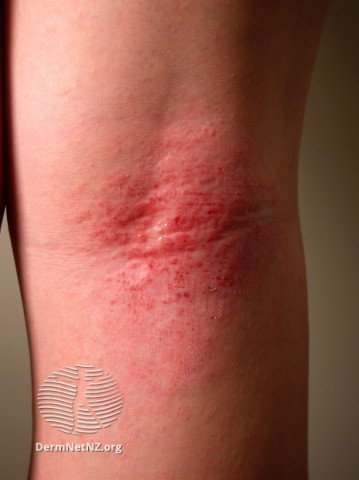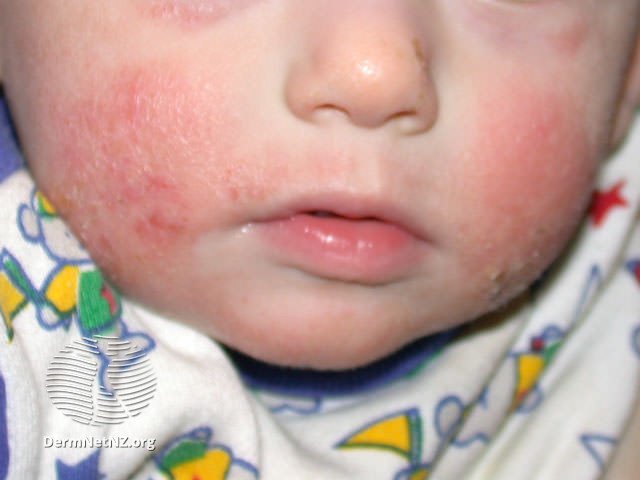
Eczema (Atopic Dermatitis): Causes and Treatment
An example of eczema, which commonly presents as small, itchy bumps in the skin creases (behind the knee, in the elbow, or on the neck).
Credit: DermNet NZ
What is eczema?
Eczema, also known as atopic dermatitis, is a long-term skin condition characterized by red, itchy, and dry patches. While more prevalent during childhood, eczema can afflict individuals of all ages. It often manifests on the face, insides of the arms, or the back of the knees. Asthma or seasonal allergies frequently accompany eczema, and a genetic predisposition can also be a factor. Although not life-threatening or contagious, managing eczema is crucial to alleviate discomfort.
What causes eczema?
The precise cause of eczema remains unidentified, but several elements including environmental conditions, genetics, and immune system reactions contribute. Some eczema sufferers possess a mutation related to keratin, a skin protein. This mutation might result in increased water loss from the skin, making it vulnerable to irritants. Associated conditions, such as asthma or allergies, can further complicate matters. The "hygiene hypothesis" posits that overly sanitized modern lifestyles might increase susceptibility to reactions against innocuous substances.
What are the symptoms of eczema?
Eczema's appearance and intensity can fluctuate. Common symptoms include:
Dry or scaly patches
Red, inflamed, raised spots
Occasional blisters with discharge
How do I treat eczema?
Managing eczema is paramount to protect the skin and prevent complications. As eczema is chronic, it is important to come up with a treatment plan that will be feasible for long-term maintenance. It's advisable to bathe daily with lukewarm water, aiding in removing potential irritants, and to employ humidifiers in dry conditions. Common treatments include:
Regular moisturization to retain skin hydration
Topical corticosteroids to address inflammation
Antihistamines for itch relief
Antibiotics for bacterial skin infections
Phototherapy sessions
Topical immunomodulators like Tacrolimus
Topical PDE4 inhibitors such as Eucrisa
Systemic medications including cyclosporine, methotrexate, or azathioprine
JAK inhibitors, topical and oral medicines targeting specific immune responses
How do I prevent eczema?
Prevention methods center around mitigating triggers and bolstering skin health:
Bathe in lukewarm saltwater to hydrate skin, avoiding excessive showers which may desiccate it.
Opt for silk clothing which is gentler on the skin, steering clear of irritants like wool.
Choose hypoallergenic and unscented products, especially soaps and detergents, suitable for eczema-prone skin.
If you are seeking professional advice or treatment for eczema, consider reaching out to a dermatologist for expert care and personalized treatment options
Eczema in infants often can present on the face. In older children, it generally moves to the arms and legs.
Credit: DermNet NZ
Eczema has a predilection for skin folds including the neck.
Credit: DermNet NZ
In skin of color eczema can also involve prominent hyperpigmentation or hypopigmentation.
Credit: DermNet NZ




